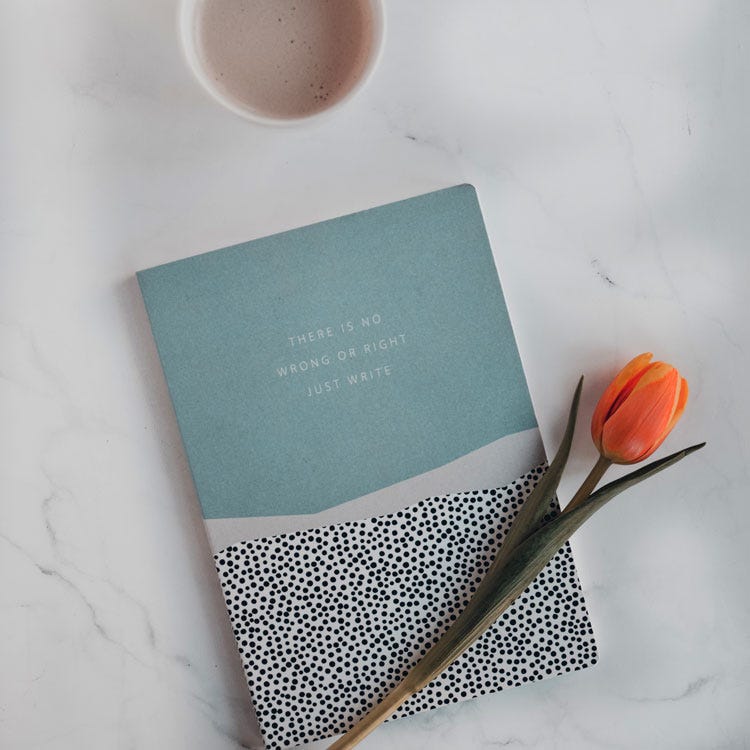✍️ Should You Be Journalling?
or, The Many Ways Journalling Can Help You Find, Keep, and Develop Your Great Ideas
I have a writer friend who has made the rest of us in the writing group swear we will burn their notebooks when they’re gone. I’m not sure what makes them think I’ll still be here – I imagine I’ll be the one holding the terrace table at St. Peter’s Bistro waiting for the rest of the group to arrive. But there you go.
I’m also not entirely comfortable with this apparently sanctioned book burning anyway. I mean, no, I don’t want people reading my stuff before it’s done. But if I’m ordering a Heavenly Latte at the aforementioned bistro, it’s as done as it’s going to get.
There are many cases of unfinished writing being published post-partum for adoring fans – or for a quick buck. I loved Douglas Adams’ posthumous collection, The Salmon of Doubt. Though it’s not polished, there is still a ton of value in that material. We get to see a bit of Adams’ writing process, which was extremely rewarding to me.
The Love of the Last Tycoon is another great example, which contains the text that F. Scott Fitzgerald had finished before his untimely death, along with his notes and outlines. Again, was it as good as it would have been finished? No. But I’ve read it a few times, and it’s definitely worth the time if you’re a Fitzgerald fan.
These are the “adoring fans” examples; I don’t see a need to point out the “quick buck” tomes. No doubt you’ve come across some yourself.
All this said, I’m a strong believer though that the writer gets to decide what happens to their work after they go to the big colophon in the sky. So if a notebook burning is needed, I’ll bring the marshmallows.
The whole conversation did get me to wondering about what might be in those notebooks to start with…
Journalling Doesn’t Just Record Ideas – It Gives You Space to Explore Them
I’ve talked in these pages before about writing down your Splendid Ideas and your Magical Ideas so you don’t lose them. In general, I was referring to snippets that leap to mind while in the shower or the shopping line so that you can sit down and develop them later. I wasn’t really talking about journalling and the like for one simple reason: I don’t journal. I’ve tried it before, particularly while travelling, but it never really took. To be clear, I’m all for it – I know I’ve forgotten things about Monkey Bay, Malawi that I would have remembered if I wrote them down. I feel that loss.
However, a great number of writers and other creatives use journalling as an in-between step to develop those ideas before writing a draft.
In some ways, journalling is like Zero Draft Writing – throwing down ideas before you start work on the first draft of the “official” writing. Journalling is perhaps a little less chaotic than Zero Draft Writing can be. But their one major similarity – that it takes the pressure off of writing “serious” work – is the one I want to focus on here. Why not have a sandbox to play around with ideas?
Advantages of Journalling
Try new styles – if you want to experiment with things like lipograms, a journal is the perfect place to do it.
Play with ideas – there are many ways to skin a novel. A journal can help you develop things like language, style, tone, point of view, etc.
Explore dead ends – sometimes when I’ve hit a dead end in my novel writing, I keep going anyway. The words and scenes I find in that dead end may not make the final cut, but I may learn something about the character or story I can use later. Journals are useful spaces for this type of exploration.
Encourages regular writing – the best and fastest way to improve your writing is to write every day. A few words or paragraphs in a daily journal help you reach that goal more easily.
Helps break (or prevent) creative block – The more regularly you right, the less susceptible you are to creative block. Besides, if you’re not sure what you want to write or what you want to write isn’t going well, you can always refer to your journal for inspiration.
Helps you find your “voice” – writers report that this is one of the hardest things to do early on. Not only does journalling provide a space for you to experiment, your voice will develop naturally with regular writing.
Reduces fear – writing regularly will reduce the writing fears we have, both in number and intensity. I don’t even think about writing anymore when I sit down to write. I don’t worry what other people with think. I don’t worry about “being successful”. I just write. Not because I’m special or have some magic formula. Only because I’ve done it so many times now that I don’t have to think about it.
Helps you learn about what you want to write – in How to Start EFFing Writing, we talked about how Karen Connelly writes in order to learn what she wants to write about. Journalling can be another way to do that.
A pressure-free space to have fun with your writing – in my mind, this is the most important point. If you can write without feeling fear or pressure or any of the other bugaboos that either keep us from writing or make us self-conscious while writing, then all the better. This relaxed attitude will eventually spill over into your “real” writing. As mentioned in the point above, the more often you sit down to write, the less fear you’ll feel each time.
Dream Weaver – Get Me Through the Night!
Dream journals deserve special mention. These are slightly different than regular journals in that you don’t necessarily write in them every day. As the name suggests, it’s simply a way to record those dreams we have so we can use them for fodder in our daytime writing. Dream journals are a great way to unlock your creativity.
Some Ideas for Journalling
Journalling is self-evident for the most part, but here are some things for you to consider before you start journalling.
It helps if you decide to journal every day. Choose when you first wake up, before you go to bed, on your lunch break, at your kid’s soccer practice... It doesn’t much matter when you journal, but it will be helpful for you and your ability to keep at it if you plan for a time that works best with your schedule.

Laptop or notepad? Some people – maybe most? – take the “journal” part literally and feel they need to go out and get a Moleskine notebook to make it official. If that’s your style and you like writing by hand, then go for it! But you can also type if you like – in a Word or Google doc, in a note-taking app on your phone, or using a program like Obsidian on your laptop. I find that using something that is fun is helpful – a Game of Thrones notebook, for example, if that’s your jam.
Don’t fret about how or what to write. The last thing you want to do is overthink this. Jump in and jot down what comes to mind. Your journal will get a style of its own soon enough.
Come to play, not to work. Journalling should be enjoyable if nothing else. Yes, there will be days when you’re madly jotting down words because your day is running out. That’s okay. Be diligent in sitting down to journal, but have fun once you’re there.
Praise yourself and give thanks. Gratitude journalling is a whole other topic that I won’t delve into here. But I will say that there are many benefits to giving gratitude and privately patting yourself on the back. Reducing fear and building confidence are two of them. Dig into gratitude journalling more if you’re so willing, and read this post on Love, Love, Love.
Use your journal to explore. Explore new techniques, new ideas, new ways of saying things… Your journal doesn’t have to be a rote “just the facts, ma’am” of your day-to-day activities. Once again, have fun with it!
Key Takeaway: Journalling helps you record ideas, but it is also a space that allows you to develop them. You can also play with voice, tone, point of view, and all the other questions you may have when writing a piece. Writers who journal regularly are more likely to develop their writing skills (and habit) faster.
Over to You: Do You Journal?
How about you? Do you journal? Do you specifically not journal? What appeals to you or repulses you? Let me know in the comments below!
I’ll leave you with a video on the advantages of journalling.
Until next time, keep writing with wild abandon!
~Graham
email me if you get lost.








TY for covering this topic! And definitely Yes! Journaling is a brilliant tool and it is free:))
Journaling is empowered even further by the right prompts that make you think in positive ways.